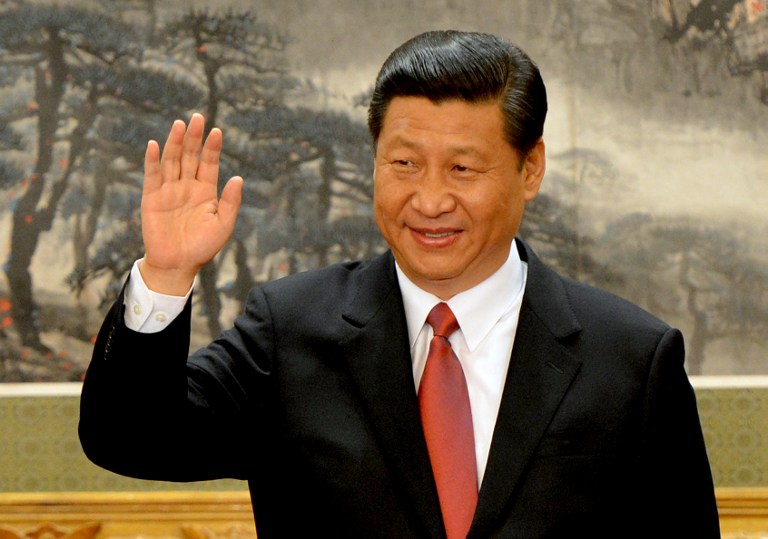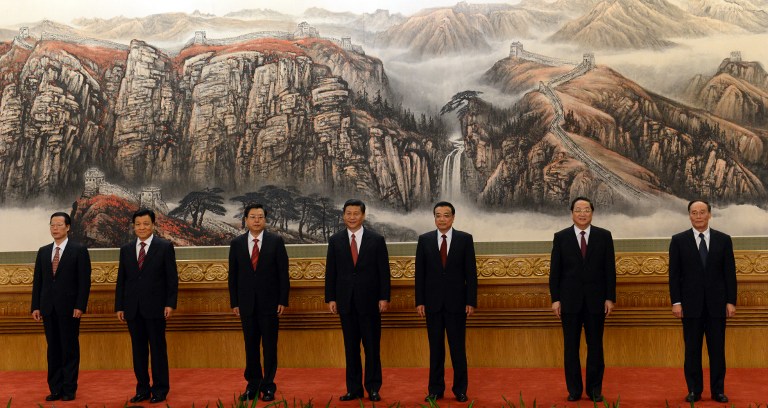SUMMARY
This is AI generated summarization, which may have errors. For context, always refer to the full article.

BEIJING, China (UPDATED) – China’s all-powerful Communist Party on Thursday, November 15, unveiled a new seven-man leadership council steered by Xi Jinping to take command of the world’s number two economy for the next decade.
After striding out in Beijing’s Great Hall of the People as the party’s new general-secretary, succeeding President Hu Jintao, Xi vowed to fight official corruption and build a “better life” for the nation’s 1.3 billion people.
Xi’s long-expected ascent to the apex of national politics was confirmed when he emerged onto the stage in the hall on Tiananmen Square in front of the rest of the elite Politburo Standing Committee, after a week-long party congress.
Xi, 59, has an impeccable political pedigree as the son of a lieutenant to revolutionary leader Mao Zedong. He will formally replace Hu as state president when the rubber-stamp legislature confirms the appointment in March.
“We are not complacent, and we will never rest on our laurels,” Xi said in his first address to the nation, standing in front of his six colleagues on the new elite committee — all men, who all bar one wore red ties.
The previous committee had nine men, and analysts said the lower number would ease decision-making at the consensus-driven heights of the Communist Party for the next decade as China shapes up to rapid change on a host of fronts.
“Under the new conditions, our party faces many severe challenges, and there are also many pressing problems within the party that need to be resolved,” Xi said, highlighting corruption and “being divorced from the people”.
“We must make every effort to solve these problems. The whole party must stay on full alert.”
The speech marked the most significant appearance on the national stage for a man about whom still little is known.
He appeared confident and far more relaxed than his stiff predecessor Hu, starting out by apologizing for the speech’s late start.
Xi’s standing at the top of China’s opaque power structure was emphasized with Hu also handing him control of the Central Military Commission.
Hu’s predecessor Jiang Zemin had clung on to that job, which controls the world’s largest military, for two years after relinquishing the presidency.
In second place in the new elite line-up was current Vice Premier Li Keqiang, whose promotion puts him in line to be appointed the country’s premier in charge of China’s day-to-day economic administration in March.
The spectacle marked the climax of years of jockeying within the secretive party, which brooks little dissent to its monopoly on political power but which has had to take new account of the public’s demands in the age of social media.
Elite group

Analysts said that despite calls from Xi, Hu and others for reform, the new Politburo Standing Committee appeared to have a conservative slant, but also stressed that continuity and stability reigned supreme in the communist system.
“I think that this is the result of compromise and consensus among different groups,” Chinese University of Hong Kong associate professor Tsao King Kwun said.
The process was essentially finalized Wednesday when the party ended its week-long congress by announcing a new 200-strong Central Committee. On Thursday it approved higher leadership bodies including the elite standing committee.
The seven men who hold innermost power are tasked with addressing a rare deceleration of economic growth that threatens the party’s key claim to legitimacy — continually improving the livelihoods of the country’s people.
China also bubbles with localized unrest sparked by public rage at corruption, official abuses, and the myriad manifestations of anger among the millions left out of the country’s economic boom.
China’s economy, which relies heavily on manufactured exports and heavy infrastructure investment, has been stunningly successful in lifting hundreds of millions out of poverty.
But the party acknowledges the model is becoming unsustainable as the economy matures and demands for higher living standards grow, and Hu last week called for a new approach with a robust private sector and stronger domestic demand.
How the new leadership under Xi will address these challenges in the world’s most populous nation remains unclear.
Analysts believed Xi’s assumption of military leadership from day one strengthens his hand.
But they said significant change was unlikely under Xi — even if he desired it, which is unclear — as he must first work to shore up his clout on the new leadership committee.
“Everything will depend on Xi Jinping and whether he exercises leadership. Will he be someone who can introduce reforms? I’m still very skeptical,” said Jean-Pierre Cabestan, an expert on Chinese politics at Hong Kong Baptist University.
Observers see two main factions, one centered on pro-business proteges of Jiang and another linked to allies of Hu, who favored more equitable development.
The run-up to this year’s congress was unsettled by events surrounding former rising star Bo Xilai, who was brought low by scandal, and by new allegations about secret riches amassed by the families of top leaders. – Robert Saiget, Agence France-Presse
Add a comment
How does this make you feel?
There are no comments yet. Add your comment to start the conversation.